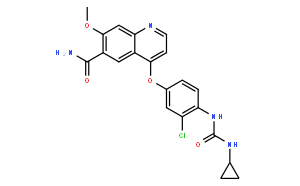
 COA COA |
 MSDS MSDS |
 HPLC HPLC |
 NMR NMR |
| CAS No: | 417716-92-8 |
| Molecular formula(MF) | C21H19ClN4O4 |
| Molecular Weight(MW): | 426.85 |
| Alias |
| In vitro | DMSO | 40 mg/mL warmed (93.7 mM) |
|---|---|---|
| Water | <1 mg/mL | |
| Ethanol | <1 mg/mL | |
| In vivo | 0.5% methylcellulose | 30 mg/mL |
| Description | Lenvatinib (E7080) is a multi-target inhibitor, mostly for VEGFR2(KDR)/VEGFR3(Flt-4) with IC50 of 4 nM/5.2 nM, less potent against VEGFR1/Flt-1, ~10-fold more selective for VEGFR2/3 against FGFR1, PDGFRα/β in cell-free assays. Phase 3. | |||||||||||
|---|---|---|---|---|---|---|---|---|---|---|---|---|
| Targets |
|
|||||||||||
| In vitro |
E7080, as a potent inhibitor of in vitro angiogenesis, shows a significantly inhibitory effect on VEGF/KDR and SCF/Kit signaling. According to the in vitro receptor tyrosine and serine/threonine kinase assays, E7080 inhibits Flt-1, KDR, Flt-4 with IC50 of 22, 4.0 and 5.2 nM, respectively. In addition to these kinases, E7080 also inhibits FGFR1 and PDGFR tyrosine kinases with IC50 value of 46, 51 and 100 nM for FGFR1, PDGFRα and PDGFRβ, respectively. [1] E7080 potently inhibits phosphorylation of VEGFR2 (IC50, 0.83 nM) and VEGFR3 (IC50, 0.36 nM) in HUVECs which is stimulated by VEGF and VEGF-C, respectively. [2] A recent study shows that E7080 treatment (both at 1 μM and 10 μM) results in a significant inhibition of cell migration and invasion by inhibiting FGFR and PDGFR signaling. [3] |
|||||||||||
| In vivo | When orally administrated in a H146 xenograft model, E7080 inhibits the growth of H146 tumor at 30 and 100 mg/kg in a dose-dependent manner and leads to tumor regression at 100 mg/kg. Furthermore, E7080 at 100 mg/kg decreases microvessel density more than anti-VEGF antibody and imatinib treatment. [1] E7080 significantly inhibits local tumor growth in a MDA-MB-231 mammary fat pad (m.f.p.) model with RTVs (calculated tumor volume on day 8/tumor volume on day 1) of 0.81, and reduces both angiogenesis and lymphangiogenesis of established metastatic nodules of MDA-MB-231 tumor in the lymph nodes. [2] |